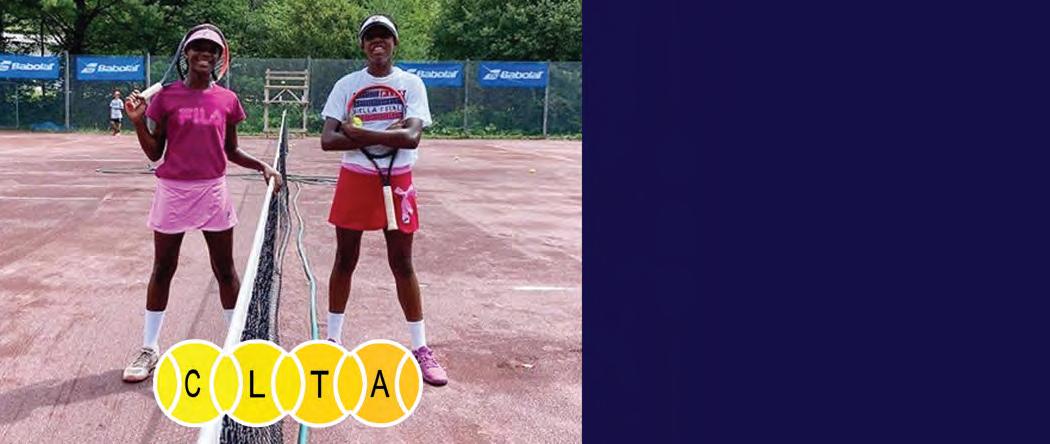
5 minute read
Can You Play Too Well In A Lesson? By Ricky Becker
MYTHBUSTERS
Can You Play Too Well in A Lesson?
Advertisement
By Ricky Becker
Yes. Yes you can. Think about the best that you’ve ever played. This was the time that everything seemed easy. The time you felt like you had all the time in the world to hit your shots. The time you almost wanted your opponent to play even better because you wanted to be challenged, and you knew you had the answer.
Were you thinking much about the BY RICKY BECKER

technique of your strokes every time you hit? Each shot you hit, did you think about where the smart place would be to hit your shot?
I hope I’m not putting words in your mouth...But no, you probably were not. It’s a commonly accepted theory in sports psychology that you play your best in any sport when everything comes naturally and you don’t have to think through things. You are just reacting. The concept of paralysis by analysis is alive.
This is where the title of this article comes into play. If you are looking to improve during your lesson you need to think about what you and your coach are working on. If you are thinking about making a technical improvement during a lesson, you are thinking during your shots. This is not conducive to playing really well. But this is ok! If you play tournaments, school tennis or even leagues, does it really matter how well you are playing in a lesson? You are trying to acquire and master tools that you can use in competition without having to think
CHRIS LEWIT TENNIS
ELITE COACH ING IN THE NYC AREA H IGH PERFORM AN CE SUM M ER CAM P FULL-TIM E TRAIN IN G AND BOARDIN G IN MAN CH ESTER, VERM ON T CHRISLEWIT.COM 914 .4 62 .2 912 CHR IS @CHR IS LEW IT.C OM

about how to do it in competition.
Sometimes casual junior players or an adult player will say to me, if they miss a couple of shots, “Ok. Now, I’m thinking too much. I’m going to play better if I don’t think”. I’ll tell them they are correct but that they are paying hard-earned money to learn and think about ways to improve that are new. Save the nonthinking for matches! If you really want to improve, you have to get through this point. What does it really matter if you are not playing as well as you can in a lesson? In fact, you are taking a lesson to think about what you are doing on the court. Unless you just wanted cardio or a steady rally ball that a pro can give, is the purpose to think during the lesson?
Speaking for myself, when I played competitively, I almost looked at it as if I was wasting “time in the zone” if I felt this way in a lesson. Yeah, it was fun to hit that point, but since it hasn’t been figured out yet how to be in the zone at all times, I didn’t want to waste my “zone time” in a lesson where score wasn’t being kept and results weren’t being recorded.
Same thing goes for the pre-match warm-up. No, you don’t want to feel sluggish and shank balls all over the place but you also don’t want to hit your highest competitive state until the match starts. The purpose of the warm-up is to sweat, get your mind focused, maybe practice a few combinations and peak with a few points at the end to get yourself to that point playing peak. I wouldn’t recommend crying after the prematch warm-up or giving a big “Lets go!” after the end of the warm-up point session…and yes, I have seen both. Use the warm-up to put you on an even-keel emotionally and re-boot. Don’t ever let the warm-up control your emotions. I’ve seen kids play incredibly well in the warm-up and once things go mildly south during the match, it’s like a punch in the face. I have never seen a correlation between the level of play in the warm-up and the match itself anyway.
In groups or playing practice sets against someone, it can be a little different. Depending on where you are with your training and competitive match schedule, it may be good to try and hit the zone. If you play throughout the year, you may want to just let it all hang out on the court and play your best without thinking to practice trying to hit that match zone. Otherwise, these practice sessions are best used by putting what you are practicing into action. If you play more seasonally and are just going out for a team, maybe this period is the week before to go out and “just play.”
Good luck getting out there and hitting the zone at the right times!
Ricky Becker is The Director of Tennis at the prestigious Pine Hollow Country Club for his ninth year, coaches highperformance juniors throughout the year and has been the Director of Tennis at three of Long Island’s biggest junior programs. As a player, Becker was the Most Valuable Player for the 1996 NCAA Championship Stanford Tennis Team and was ranked top-five nationally as a junior player. He can be reached at rbecker06@yahoo.com, 516-359-4843 or via juniortennisconsulting.com.
WE'VE GOT YOU COVERED Play tennis year round under a Farley bubble. The Farley Group is the world leader in air-supported structures and has provided over 20 tennis bubbles in New York and Long Island. Contact us today to learn about how you can turn your outdoor courts into a year round facility.















